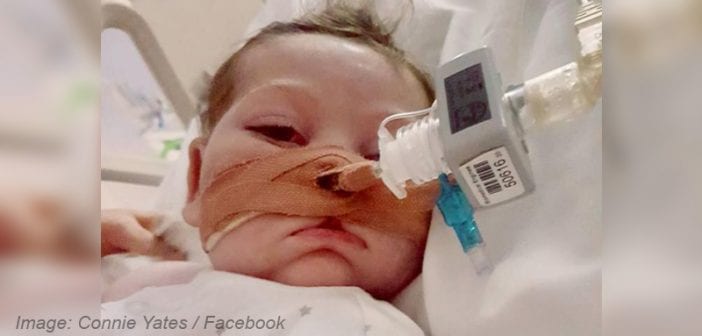The case of British baby Charlie Gard has gripped the international press. Charlie is on life support in a London hospital, and the hospital sought to end his Life against his parents’ wishes. After the European Court of Human Rights rejected the request from Charlie’s desperate parents to intervene in the case last week, the world awaits news of Charlie’s death. The hospital was reportedly planning to remove life support on June 30, but after his distraught family pleaded for a few final days with their ill son, the hospital agreed to postpone. Meanwhile, media outrage at the anti-Life ruling continues and more than 100 protesters gathered in front of Buckingham Palace to support Charlie.
Charlie was born in August of 2016, and appeared perfectly healthy. At eight weeks, however, he was diagnosed with a rare and often fatal mitochondrial disorder. Since then, Charlie has been at Great Ormand Street Hospital in London receiving life support to assist with breathing and other vital functions. Earlier this year, the hospital requested the courts grant permission to end Charlie’s life support against the wishes of his parents, Chris Gard and Connie Yates. The hospital argues care is futile, while his parents say he shows signs of improvement and they want to pursue treatment.
Gard and Yates appealed the decision and fought for the legal right to transport their son to the United States for experimental treatment. Charlie’s parents began an online fundraiser that raised more than $1.3 million, which would cover the cost of medical care on the flight to the United States and would pay for the treatment. Charlie is reportedly only the 16th person to be diagnosed with this rare mitochondrial condition, so there is no known treatment. Doctors in the U.S. are testing a drug that might combat Charlie’s disease. Disturbingly, the courts ruled over and over in the hospital’s favor claiming that such treatment would only prolong Charlie’s suffering.
When hospitals and bureaucrats have the power to decide who lives and dies, the Right to Life of every person is at risk. In Texas, patients like Charlie face a similar threat under the draconian rule of the Texas Advance Directives Act. The subjective assessments that care is “futile” or that a person’s “quality of life” is not good enough are never valid reasons to end someone’s Life. Most importantly, Charlie’s parents are his legal guardians, and they are the ones who should decide if the potential benefits of experimental treatment outweigh the risks. As Rober Moynihan observed:
Of course parental emotion sometimes trumps reason. Parents will attempt everything possible to save their children, even refusing to accept the fact that a certain situation cannot be healed or cured by medical means.
But in this case, where the parents in their desperation found the funds to try one last possibility to heal their child, it seems that the doctors, the courts, and the European Court, should grant the parents their right, as parents, to have the ultimate responsibility for their child, and allow them to do everything they can to save his life.
Moynihan expresses the sentiment of many people outraged by the hospital’s power to decide whether a sick little boy is able to live. Charlie’s parents told the Daily Mail that the hospital will not even allow them to pay for their son to be transferred to their home to die. In this tragic case, a hospital has been given the power over Life and death, and Charlie’s parents are not even allowed to decide where their son will die. 17-year-old Alex Nagel, who organized the protest outside Buckingham Palace, said simply, “When I grow up one day, when I have children, I would want anyone to support me the way I’m supporting them.” As the final days or hours of Charlie’s young Life draw to a close, our thoughts and prayers are with his family. We continue our work to build a culture in which no one’s Right to Life is at the mercy of nameless, faceless hospital committees and bureaucrats.


